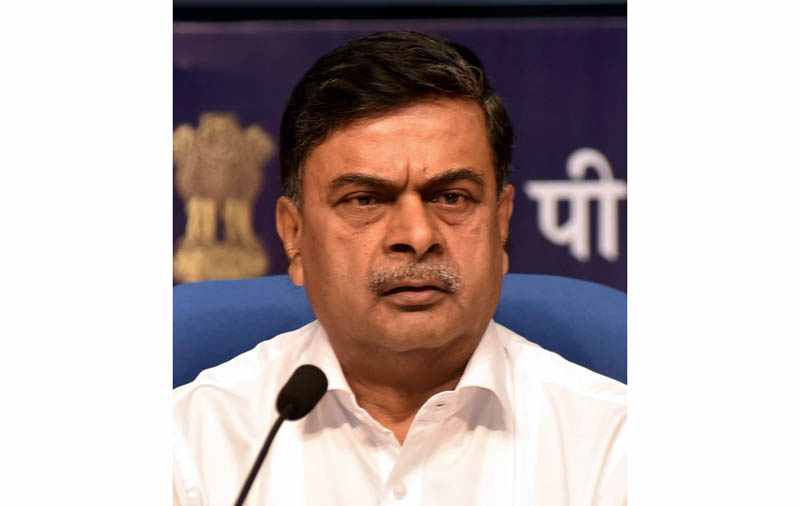
NEW DELHI, June 25: Power Minister R K Singh has said that as much as USD 70 billion (about Rs 5.2 lakh crore) has been invested in renewable energy across the country in the past seven years.
This assumes significance in view of India’s ambitious target of having 175 gigawatts (GW) of renewable energy by 2022.
Singh was addressing at an event on ‘Accelerating Citizen Centric Energy Transition’ yesterday evening, organised by The Ministry of New and Renewable Energy (MNRE). It was conducted in collaboration with the Permanent Mission of India (PMI) to the United Nations and the Council on Energy, Environment and Water (CEEW).
The virtual event was organised on the sidelines of the Ministerial Thematic Forums week (June 21-25) for the UN High Level Dialogue on Energy to be convened on September 20 this year.
India has been designated a Global Champion for Energy Transition, one of the five themes at the dialogue.
Singh said, “During the past seven years, over USD 70 billion investment has been made in renewable energy in India. India has a liberal foreign investment policy for renewables allowing 100 per cent FDI through the automatic route in sector.”
He added that ensuring ‘ease of doing business’ is the government’s utmost priority. “Our continuous focus is on maintaining sanctity of contracts and safeguarding investments.”
The minister also talked about the establishment of dedicated project development cells (PDC) and foreign direct investment (FDI) cells in all ministries for handholding and facilitating domestic and foreign investors.
Adequate measures and safeguards have also been undertaken to address the concerns of businesses and investors arising out of the COVID-19 pandemic, Singh added.
He launched a booklet on ‘The India Story’, a compilation of Indian initiatives that are shaping India’s energy transition.
The minister said ‘The India Story’ booklet captures the essence of some of the flagship initiatives that have accelerated energy transition.
“These will continue to power our ambitious renewable energy programmes, with the end goal of ensuring access to affordable, reliable, sustainable and modern energy for all, while always keeping the citizen at the center of this transition,” he added.
He also launched a website (www.Energytransition.In), which will act as a repository of energy transition related knowledge resources from around the world.
Singh further said a Renewable Energy Investment Promotion and Facilitation Board (REIPFB) portal has also been developed to provide a one-stop assistance and facilitation to the industry and investors for development of projects and bringing new investment to the renewable energy sector in India.
He lauded the commitment shown by the Indian industry to India’s energy transition plans.
Several members from the industry have voluntarily declared RE goals and committed to the carbon disclosure project (CDP), renewable 100 per cent and science-based targets (SBTs).
Many of them are also preparing substantive energy compacts for the September Dialogue.
He was pleased to inform that JK Cement, UltraTech, Toyota and NTPC have already submitted their energy compacts.
While talking about the initiatives that will pave the way for future of energy transition in India, Singh said rules are being framed for ‘green tariff’ policy.
The policy will help electricity distribution companies (discoms) supply electricity generated from clean energy projects at a cheaper rate as compared to power from conventional fuel sources.
In addition to that, the government is promoting Green Hydrogen with obligations for Fertilisers and Refining industries (Green Hydrogen Purchase obligations).
The minister also mentioned about the recent initiatives in the renewable energy sector such as viability gap funding options for offshore wind energy, launching of green term ahead market and green day ahead market.
Rules for facilitating RE through open access and RE procurement through exchanges will also be notified to promote non-conventional resources of energy. Singh said that in the past six years, India’s installed renewable energy capacity has increased by over two-and-a-half times and stands at more than 141 gigawatts (including large hydro), which is about 37 per cent of the country’s total capacity (as on June 16, 2021). (PTI)
During the same period, the installed solar energy capacity has increased over 15 times and stands at 41.09 GW. India’s renewable energy capacity is the fourth largest in the world.
India’s annual renewable energy addition has been exceeding that of coal-based thermal power since 2017. (PTI)

